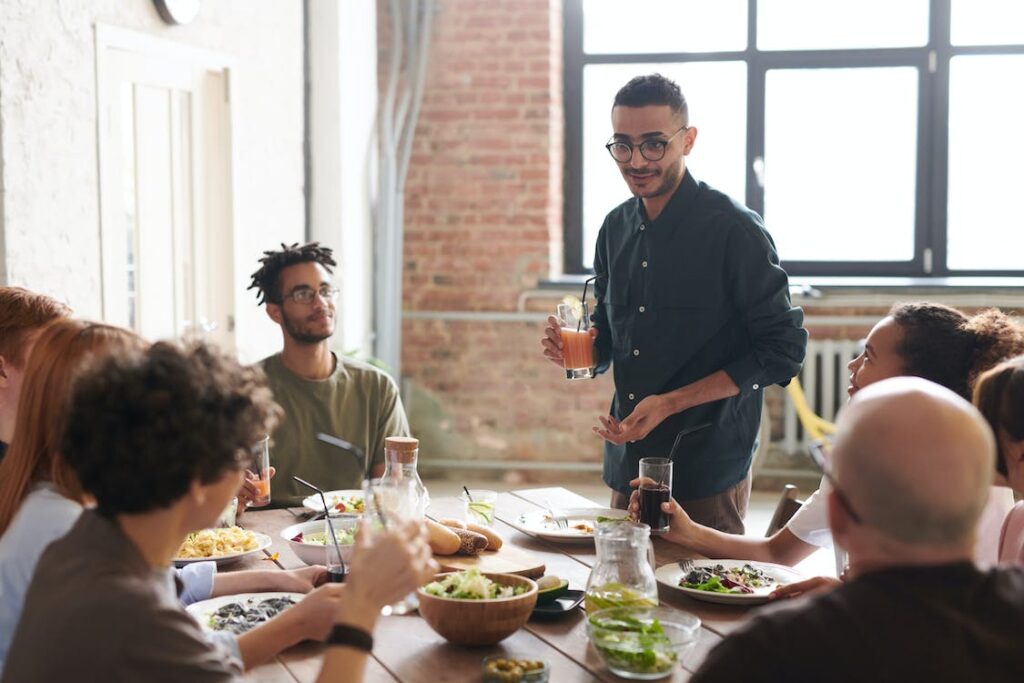
As we get older it gets easier to eat alone, but do we lose something when we don’t dine with others?
By Willem Gokemeijer
My parents placed a lot of importance on family dinners. At first, it was easy. My brother and I were young and devoid of late-night plans. Our mom stayed home and took care of us. My dad had a typical work schedule.
Even as we grew, and things became more complicated with soccer practices, math homework, and my mom’s part-time job, we would have dinner together whenever possible. It was usually around 6:30 p.m., but if it had to go to 8 p.m., so be it.
It helped that my mom was an excellent cook. She would go to the grocery store almost every day, usually Whole Foods, to get fresh ingredients. I remember her recipe books would overwhelm a shelf in the cupboard. Each binder would be filled to the brim with cutouts from Bon Appetit and sauce-stained pages printed from the Food Network website.
We would all sit together and, at first, it would always be pretty quiet as everyone enjoyed their first few bites. Then whoever had the most exciting day wouldn’t be able to wait any longer and the tales would begin.
In my mid-teens, my parents divorced. I worried that the family dinner would die. Instead, it became even more important. Without each other to talk to every day, I think my parents shared more with my brother and me than before. So the dinners lived on, even if it was only my mother’s delicious cooking half the time.
The obvious end was my move into college. It’s hard to keep up a family dinner when you are leaving the family. But in a way, the large dining hall becomes a kind of family dinner. This time with a much larger family and far less consistent participants but every evening I would know at least one person there.
Now that I’m on my own, in an apartment with four others, family dinners have finally died. It wasn’t a quick death. We would often eat together at the start. Then we got busier with homework, intramurals, and girlfriends. Eventually, the apartment rarely had more than two people in the kitchen.
I might eat with my roommates occasionally. Few words are exchanged. Time is devoted to phones. The kitchen might as well be a break room.
It makes sense, College can get really busy, and it’s easier to only worry about your own schedule when cooking and eating. But still, I miss those shared dinners. It turns out, there is evidence that eating alone is harmful to both our mental and physical health.
A study in South Korea found that students who eat alone are more likely to experience depression. Another South Korean study found that men who eat alone had a 45% increased risk of obesity and a 64% increased risk of developing metabolic syndrome (a cluster of conditions that occur together, increasing your risk of heart disease, stroke, and type 2 diabetes, per the Mayo Clinic).
There is also plenty of evidence that the dinners of my childhood were good for me.
Researchers have shown that family dinners are crucial to kids’ development. It betters their education skills, makes family units more connected, and leads to healthier eating. Why would we assume those benefits stop once we leave the home?
In fact, the University of Oxford found that “communal eating increases social bonding and feelings of wellbeing, and enhances one’s sense of contentedness and embedding within the community.”
So yes, it’s easy to lose family dinners as we grow older, but that doesn’t mean it’s a good thing or the way it has to be. Instead, we should fight a lot harder to keep communal meals and cultivate them where we can.
The other night my roommate and I made tacos. We split up the work. I cooked the beef while he diced the tomatoes. I put way too much garlic in the beef and he mashed the tomatoes more than he sliced them. Skeptical about our efforts, we took our first bites with apprehension and chatted about our days.
They tasted delicious…or maybe they were just average. It was a nice dinner either way.